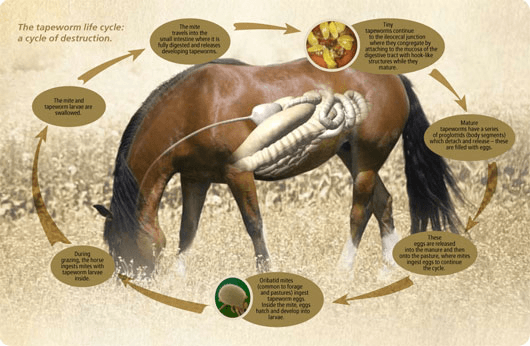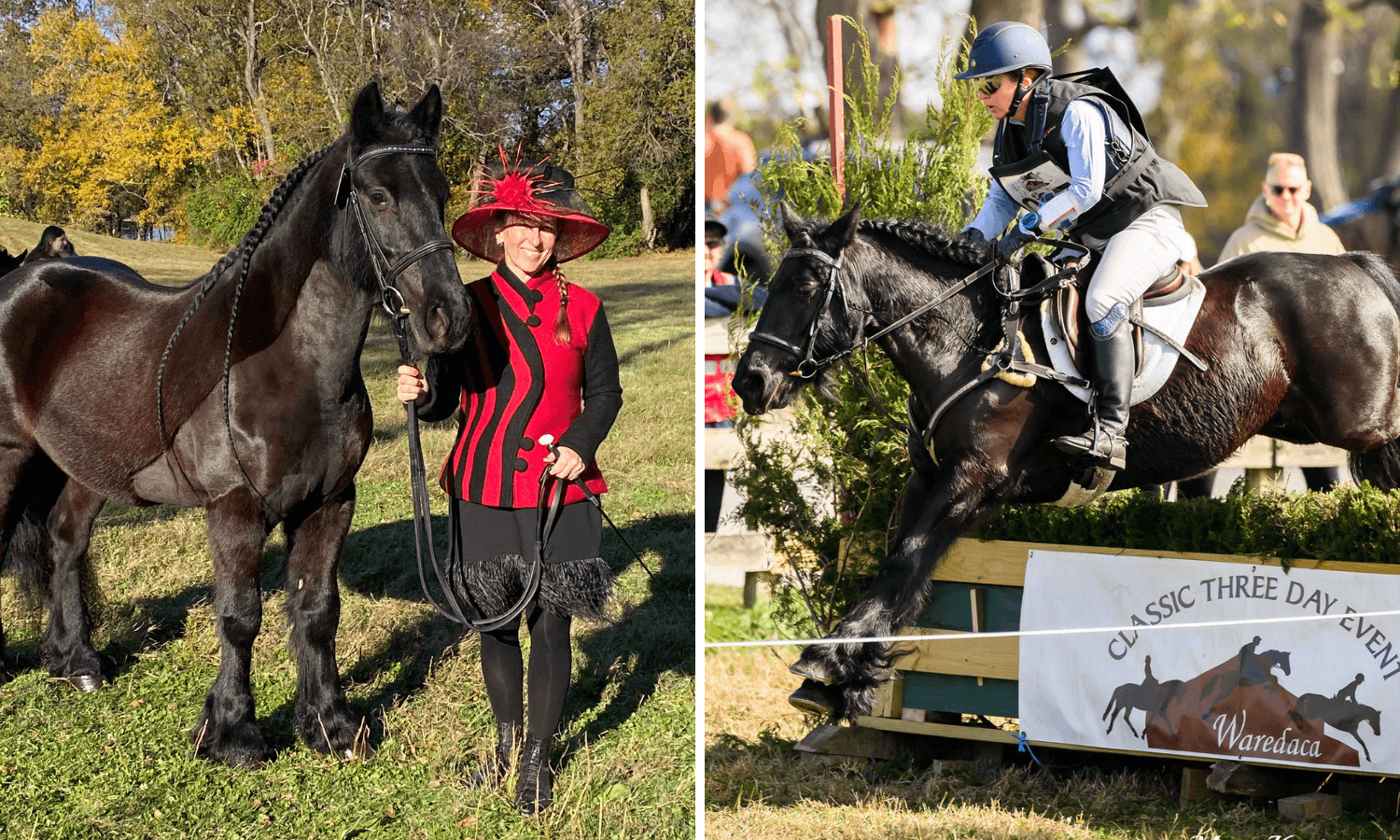Eight Facts About Equine Deworming: How Much Do You Know?

Duluth, GA. – February 22, 2011 – Deworm all your horses, do it on a frequent and regular schedule, and rotate your product choice through different classes of dewormers. Right?
Wrong. Equine parasitologists now advise you to rethink the traditional rotational deworming protocol. Conventional wisdom has changed, and it’s forcing a need to relearn what we’ve assumed to be “fact” about parasite control. The following is a quick fact check for you to use before you deworm again.
FACT. Rotating dewormers is not only unnecessary, it actually may be harmful.
“Most horse owners think they have been doing the right thing to fight resistance by rotating dewormers. But using several products, some of which may not be effective for parasites infecting horses on your farm, doesn’t work,”1 says Frank Hurtig, DVM, MBA, director, Merial Large Animal Veterinary Services. “And indications are that this practice may actually contribute to resistance.”2,3,4
Rotational deworming, according to Dr. Hurtig, is an outdated practice that originated primarily because early dewormers weren’t entirely effective against all worms. 4,5 They also believed rotating product classes would help keep resistant worm populations from arising on a farm or in an area, but it does not appear to be slowing the development of resistance.2,3
Resistant worms occur by chance but they cannot be diagnosed on a farm until they make up at least 25 percent of the worm population.6 By then, it is too late to correct.7 This fact highlights the importance of deworming only the horses that need it and utilizing Fecal Egg Count Reduction Tests (FECRTs) as part of an overall strategic deworming protocol.7,8 By using this strategy, you can regularly monitor the efficacy of your program and the products you are using, as well as help determine if resistance exists on your farm.7 It is important to remember that resistance develops to classes of drugs and not just individual products within classes.1,2,4,5
FACT. As it turns out, leaving a residual worm population on a farm not only does no harm, it’s actually necessary.
True. It’s called “refugia.” As illogical as it may sound, you should actually welcome a population of parasites on the farm that are susceptible to dewormers. By leaving that refuge population of non-resistant (susceptible) worms to interbreed with resistant parasites, you help reduce the development of resistance.1,4,9
“You actually need nonresistant parasites to keep resistance from arising,” says Hoyt Cheramie, DVM, MS, manager of Merial’s Large Animal Veterinary Services. “Maintaining refugia is pivotal in slowing the rate of development of resistance.”9
Trying to achieve a zero egg count and virtually no parasites on pasture can be both detrimental to horses and impossible to attain.1,8,10 “In fact, it is a better idea to identify the horses that need more parasite control and those that need less, and then treat them accordingly,” says Dr. Cheramie. “Using this new strategy, your deworming frequency will likely markedly decline. In fact, most of your horses (likely about 60 to 80 percent) may only need a deworming treatment in spring and in fall1, which means it’s vital that the products you are using on your farm work. We have to get back to the foundation concept that we only need to manage worm burdens to keep them below harmful levels in susceptible individuals.”
FACT. Only about 20 to 30 percent of the horses in a herd shed about 80 percent of the farm’s worm eggs.1,5,8
It’s true. Most worm contamination on a farm comes from a small subset of high shedders. By working with your veterinarian to identify these high shedders and then target your deworming specifically to them using effective products, you can obtain optimum worm control on your farm and may reduce the risk of developing worm populations that are resistant to dewormers.1,2,5,8
FACT. Parasite management should be a farm concern, not just an individual horse concern.
“Today’s style of targeted, strategic parasite management eventually requires managing parasitism at a farm level,” counsels Dr. Hurtig. “That means you must manage the horses, as well as the environment around them, to best control the populations of worm species there. In addition to strategic deworming, all the old-fashioned staples of good pasture management—manure composting, pasture rotation, mowing and dragging—are also an integral part of farm parasite population management in the post-rotation era.”
Dragging or other methods of breaking up manure must be done with care, though, since this can actually spread worms out of manure piles over larger parts of the pasture and increase transmission. In areas with hot, dry summers, the heat and lack of moisture will greatly reduce pasture parasite levels. Parasites can survive in cold temperatures, with mild, moist conditions providing an ideal environment for transmission.11
FACT. No dewormer classes are immune to the eventual development of resistance.
“Although resistant populations of worms have developed at different rates of speed depending on the parasite, drug and frequency of use,” says Dr. Hurtig, “the fact is every class of dewormer currently available is at risk for resistant worm populations to arise.12-16 This is why it is so important for horse owners to work with their veterinarian and take action today.”
“We still have effective, broad-spectrum products available based on the macrocyclic lactones, like ZIMECTERIN® (ivermectin) and ZIMECTERIN® Gold (ivermectin/praziquantel),” says Dr. Cheramie. “However, we know that no dewormer class is immune from the mechanics of resistance. If we don’t do something to head it off, we’re threatening our ability to control worms for future generations.”
FACT. You can’t manage what you don’t measure, even when it comes to deworming.
Working with a veterinarian who understands this new concept of parasite control, horse owners need to monitor their farm to determine which horses need to be treated, and to understand which products are still effective on their farm.7 Such monitoring requires a specific but relatively simple series of Fecal Egg Count (FEC) tests, to determine which horses are harboring which worms, which horses are shedding relatively high numbers of worm eggs, and which medications are still effective for controlling the worms.1
FACT. Veterinary advice on deworming doesn’t cost, it pays.
Indeed. While involving your veterinarian in things like FECTs and FECRTs may have a cost, it is often not as much as continuing to use multiple doses of products that may have little benefit for parasite control on your farm and may actually increase the prevalence of resistant parasites.1,5,7,11 It’s important that horse owners work with a knowledgeable equine veterinarian to sample fresh manure for the presence and quantities of worm eggs in each horse on the farm. Developing a deworming strategy based on the individual needs of your horses can actually save you money in the long run.1,17
FACT. Tapeworms are a common, hidden and harmful parasite.
Tapeworms are a common parasite in the horse,18 with more than 54 percent of horses nationwide infected at some point in their lives.19 While signs of infection are not obvious and often go undiagnosed, this parasite can cause potentially serious health problems including colic, irritation and inflammation of the intestine, especially the colon.20 The tapeworm is not a parasite horse owners can afford to ignore.
GET THE FACTS. In support of horse owners’ efforts to learn the facts about strategic deworming protocols, Merial has launched an educational campaign called “Greetings, Human.” The initiative humorously recognizes that if worms could talk, they would tell horse owners to ignore these new facts and to keep on using dewormers the way they have for decades. For more information about this campaign and facts on parasite control and resistance, go to www.zimecterin.com.
About ZIMECTERIN GOLD
ZIMECTERIN Gold combines ivermectin, a leading ingredient that controls a wide variety of parasites, with praziquantel, an ingredient that specifically controls tapeworms. Together, they provide excellent equine parasite control. ZIMECTERIN Gold is approved to control more species and stages of equine parasites than any other brand, including benzimidazole-resistant small strongyles.21 It controls 47 species and stages of equine parasites in all.22
Plus, ZIMECTERIN Gold was the first dewormer approved by the FDA to effectively control tapeworms* with a single dose. Tapeworms have been recognized as a significant threat to the health of horses.20

About Merial
Merial is a world-leading, innovation-driven animal health company, providing a comprehensive range of products to enhance the health, well-being and performance of a wide range of animals. Merial employs approximately 5,600 people and operates in more than 150 countries worldwide. Its 2010 sales were more than $2.6 billion. Merial is the Animal Health subsidiary of sanofi-aventis. For more information, please see www.merial.com.
###
Important Safety Information
Warning: Not for use in humans. Keep this and all drugs out of reach of children. In horses, there have been rare reports of swelling and irritation of the mouth, lips, and tongue following administration of ZIMECTERIN Gold. These reactions have been transitory in nature. Do not use in other animal species as severe adverse reactions, including fatalities in dogs, may result.
*Anoplocephala perfoliata
®ZIMECTERIN is a registered trademark of Merial Limited. ©2010 Merial Limited, Duluth, GA. All rights reserved. EQUIZIM1105 (01/11)
1 Kaplan RM. These ain’t your father’s parasites: Dewormer Resistance and New Strategies for Parasite Control in Horses. Proceedings 2009 Florida Equine Institute. 2009. Gainesville, Fla.
2 Kaplan RM. Anthelmintic resistance in nematodes of horses. Vet Res. 2002;33(5):491-507.
3 Uhlinger CA, Kristula M. Effects of alternation of drug classes on the development of oxibendazole resistance in a herd of horses. J Am Vet Med Assoc. 1992;201:51-55.
4 Reinemeyer CR. Rational approaches to equine parasite control. Equine Parasite Control Kentucky Equine Research, Inc. 64-72.
5 Kaplan RM, Nielsen MK. An evidence-based approach to equine parasite control: It ain’t the 60s anymore. Equine Veterinary Education. 2010;22(6):306-316.
6 Martin PJ, Anderson N, Jarrett RG. Detecting benzimidazole resistance with faecal egg count reduction tests and in vitro assays. Australian Veterinary Journal. 1989;66(8):236-240.
7 Herd RP. Control strategies for ruminant and equine parasites to counter resistance, encystment and ecotoxicity in the USA. Vet Parasitol. 1993;48(1-4):327-336.
8 Brazik EL, et al. Pyrantel pamoate resistance in horses receiving daily administration of pyrantel tartrate. J Am Vet Med Assoc. 2006;228:101-103.
9 van Wyk JA, Hoste H, Kaplan RM, Besier RB. Targeted selective treatment for worm management – how do we sell rational programs to farmers? Vet Parasitol. 2006;139(4):336-346.
10 Reinemeyer, CR. Controlling strongyle parasites of horses: a mandate for change. Proceedings of the American Association of Equine Practitioners’ Special Lectures 2009;55:352-360.
11 Swiderski C, French D. Paradigms for Parasite Control in Adult Horse Populations: A Review. Proceedings AAEP 2008:54.
12 Shoop WL, Haines HW, Michael BF, Eary CH. Mutual resistance to avermectins and milbemycins: oral activity of ivermectin and moxidectin against ivermectin-resistant and susceptible nematodes. Vet Rec 1993;133:445-447.
13 Conder GA, Thompson DP, Johnson SS. Demonstration of co-resistance of Haemonchus contortus to ivermectin and moxidectin. Vet Rec 1993;132:651-652.
14 Le Jambre LF, Gill JH, Lenane IJ, Lacey E. Characterization of an avermectin-resistant strain of Australian Haemonchus contortus. International Journal for Parasitology 1995;25:691-698.
15 Sangster NC, Pharmacology of anthelmintic resistance in cyathostomes: will it occur with the avermectin/milbemycins? Vet Parasitol.1999;85(2-3):189-204.
16 Slocombe JOD, de Gannes RVG, Lake MC. Macrocylic lactone-resistant Parascaris equorum on stud farms in Canada and effectiveness of fenbendazole and pyrantel pamoate. Vet Parasitol. 2007;145(3-4): 371-376.
17 Kaplan, RM. These ain’t your father’s parasites: An evidence-based medical approach to equine parasite control. The Practitioner. 2008.
18 Bello TR, Abell JE. Are equine tapeworms an emerging disease? A retrospective study. Journal of Equine Veterinary Science 1999:19(11):723-727.
19 Reinemeyer C, et al. A prevalence survey of antibodies to Anoplocephala perfoliata in horses from the United States. Proc WAAVP 2005:168.
20 Proudman CJ, Trees AJ. Tapeworms as a cause of intestinal disease in horses. Parasitol Today. 1999;15(4):156-159.
21 Based on data provided on the ZIMECTERIN Gold label.
22 Based on data provided in the FDA Freedom of Information summaries















